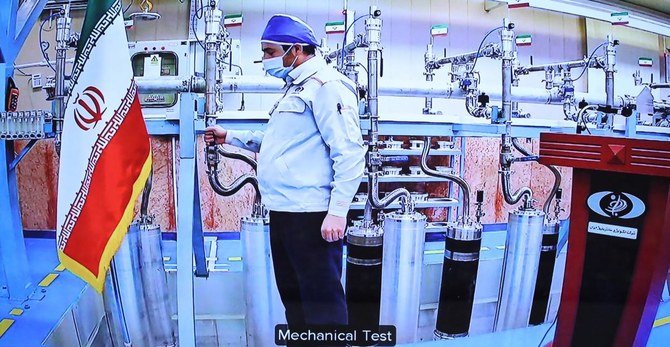
- ARAB NEWS
- 16 Apr 2024

DUBAI: Iran will begin enriching uranium to 60 percent purity, higher than the program ever has before though still short of weapons grade, after an attack on its Natanz nuclear facility, an Iranian negotiator said Tuesday.
The announcement marks a significant escalation after the sabotage, suspected to have been carried out by Israel. It could result in further action by Israel, whose Prime Minister Benjamin Netanyahu has vowed never to allow Tehran to obtain a nuclear weapon, and further raise tensions across the Mideast.
Nuclear negotiator Abbas Araghchi’s comment, quoted by the state-run IRNA news agency, came after Iran’s foreign minister warned that the weekend assault could hurt ongoing negotiations over its tattered atomic deal with world powers. Those talks are aimed at finding a way for the United States to re-enter the agreement, the goal of which is to limit Iran’s enrichment of uranium in exchange relief on sanctions.
Iran had been enriching up to 20 percent. That is a short technical step to weapons-grade levels of 90 percent.
The International Atomic Energy Agency said it was aware of the media reports but had no comment at the time.
Press TV, the Iranian state television’s English-language arm, separately said that the IAEA had been informed of the move. It said the enrichment would begin as of Wednesday.
The broadcaster also quoted the negotiator as saying Iran would introduce another 1,000 centrifuges at Natanz, without elaborating.
Iran’s Supreme Leader Ayatollah Ali Khamenei had threatened to go to 60 percent enrichment in February if the country needed.
“We are determined to develop our nuclear capabilities in line with the needs of the country,” Khamenei said then, according to a transcript of his speech published by his website. “For this reason, Iran’s enrichment will not be limited to 20 percent, and we will take whatever action is necessary for the country.”
Iran previously had said it could use uranium enriched up to 60 percent for nuclear-powered ships. The Islamic Republic currently has no such ships in its navy.
Details remained scarce about the weekend attack at Natanz. The event was initially described only as a blackout in the electrical grid feeding above-ground workshops and underground enrichment halls — but later Iranian officials began referring to it as an attack.
The US has insisted it had nothing to do with Sunday’s sabotage. Instead, Israel is widely believed to have carried out the assault that damaged centrifuges, though it has not claimed it.
But earlier Foreign Minister Mohammad Javad Zarif still issued a warning to Washington.
“Americans should know that neither sanctions nor sabotage actions would provide them with an instrument for talks,” Zarif said in Tehran alongside visiting Russian Foreign Minister Sergey Lavrov. “They should know that these actions would only make the situation difficult for them.”
Zarif separately renewed his earlier warning to Israel over the sabotage, saying that if Iran determines its archenemy was behind it, “then Israel will get its response and will see what a stupid thing it has done.”
Kayhan, the hard-line Tehran newspaper, urged Iran to “walk out of the Vienna talks, suspend all nuclear commitments, retaliate against Israel and identify and dismantle the domestic infiltration network behind the sabotage.”
“Despite evidence that shows the role of the US as main instigator of nuclear sabotage against Iran, unfortunately some statesmen, by purging the US of responsibility, (aid) Washington’s crimes against the people of Iran,” the paper said in Tuesday’s editions.
While Kayhan is a small-circulation newspaper, its editor-in-chief, Hossein Shariatmadari, was appointed by Supreme Leader Ayatollah Ali Khamenei and has been described as an adviser to him in the past.
Such a walkout remains unlikely as the administration of President Hassan Rouhani, whose main diplomatic achievement was the 2015 accord, hopes to get the US to rejoin it and provide desperately needed sanctions relief. However, pressure does appear to be growing within Iran’s theocracy over how to respond to the attack.
The talks in Vienna — among Iran, world powers still in the deal and the US — are aimed at reviving America’s role in the agreement that former President Donald Trump abandoned and lifting the sanctions he imposed. Iran, in turn, would return to the limits set by the deal and dilute its growing stockpile of uranium — some of which has been enriched up to a short step away from weapons-grade levels.
Iran insists its nuclear program is peaceful, though the West and the International Atomic Energy Agency say Tehran had an organized military nuclear program up until the end of 2003. However, the deal prevents it from having enough of a uranium stockpile to be able to pursue a nuclear weapon.
Rouhani met later Tuesday with Lavrov and stressed the importance of all parties returning to the deal. Russia is a member of the nuclear deal.
“We are neither ready to accept less than that, nor are we after achieving more than that,” he said.
Reuters